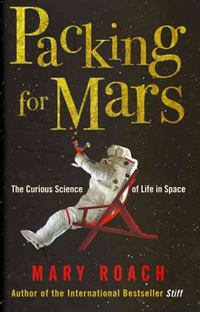No-one should be embarrassed about getting sick in space

Packing for Mars: the Curious Science of Life in Space
by Mary Roach
This was my first read for the 2014 Popular Science Reading Challenge. It was perhaps a bit of an easy choice to begin with, as I knew Roach’s reputation for humour and I’m already familiar with the subject. But it was still a good, enjoyable read.
Roach’s premise is to look at the nitty gritty detail of what would be involved in sending humans to Mars. But this isn’t about rockets and propulsion systems, this is about the human side – how will people cope with a year or more stuck in a rocket? She looks at this biologically, psychologically, but also at the practical side of things – food, facilities and so on.
“As a gross overgeneralization, the Japanese are well suited to life on a space station. They’re accustomed to small spaces and limited privacy. They’re a lighter, more compact payload than the average American. Perhaps most important, they’re raised to be polite and to keep their emotions in check.”
Roach has spoken to almost everyone who can contribute to this conversation – experts from NASA, the European, Russian, Canadian and other space agencies, university researchers, astronauts – and she really has a gift for picking out the curious details, the facts that make you laugh and learn. She also clearly has a fondness for asking the awkward questions, the things most people don’t discuss, so there’s a chapter each on sex in space, vomit and human waste.
“No-one, not Jake Garn or Rusty Schweickart or Frank Vomiting [Borman], should be embarrassed about getting sick in space. Some 50–75 per cent of astronauts have suffered symptoms of space motion sickness. ‘That’s why you don’t see much shuttle news footage the first day or two. They’re all, like, throwing up in a corner somewhere,’ says Mike Zolensky [NASA curator].”
It’s a genuinely interesting book on a topic that has been extensively researched despite it not being definite that it will ever happen. Roach manages to show great respect for astronauts and scientists while at the same time probing for very intimate facts. She shows a sense of humour about her own curiosity as well as the facts she discovers. But she is also tenacious when she wants to be, doggedly pursuing the truth behind various intriguing rumours.
“It is hard to imagine anyone going through the significant risk and hassle of catheterizing a chimpanzee just to keep him from playing with himself during training sessions. As for the balloon catheter, it was patented in 1963 – two years after Enos’s flight – as a tool to remove blood clots, not to discourage chimpanzee masturbation…Enos, your name is cleared.”
I think what holds me back from outright loving this book is that it didn’t stick closely enough to its premise. Particularly in the second half of the book, it felt more like a book about historical and current humans in space, with some chapters not even mentioning how experience to date in the topic at hand might be extrapolated to a manned Mars mission. And that would have been fine without the title and opening chapters concentrating on the Mars idea. Obviously some historical stuff is necessary, and it’s all extremely interesting, but it isn’t quite the book it sets out to be.
My one other quibble is that early on Roach refers to “US astronaut Helen Sherman”. Oh no no no. Helen Sharman was the first Briton in space. She wasn’t even trained in the US; she trained in Russia with the cosmonauts she flew with to Mir space station. So that’s two errors in one sentence. And I’m by no means an expert in any of this stuff, so how do I know that the rest of the book isn’t riddled with errors? (Obviously these might well be typesetting errors rather than Roach’s own, but it’s still a bit shoddy.)
But those fairly minor gripes aside, this was a very entertaining and informative book.
Published 2010 by Oneworld.
Source: Borrowed from work.
Challenges: This counts toward the 2014 Popular Science Reading Challenge.
I was tempted by this up until the Sharman error. Unforgivable.
I presume you have a lengthy popular science reading list but if they are not on there already I would suggest:
Bryson – A Complete History of Nearly Everything
Sobel – Longitude
Singh – The Code Book and Fermat’s Last Theorem
Hawkins – A Complete History of Time
Dawkins – The Blind Watchmaker
P.S.
Various – The Hacker Ethic
Johnson – Emergence
dangusset I do indeed have a long list for this challenge but I’m happy to add more!